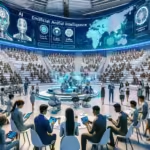Foreseeing Tomorrow: The Role of Artificial Intelligence
Artificial Intelligence (AI) is not a concept rooted in the distant future; it is a vibrant reality, evolving dynamically in today’s tech-driven world. Several alumni from the Rochester Institute of Technology (RIT) recently shared their insights into AI’s promising future at the Imagine RIT Symposium. This gathering of brilliant minds provided an invaluable perspective on how AI can reshape industries, businesses, and daily life. Let’s delve into the contributions and discussions held at this enlightening event.
Understanding the Current AI Landscape
AI is no longer confined to the realms of science fiction; it permeates various facets of everyday life. From the smartphones in our pockets to complex algorithms driving large-scale business operations, AI has infiltrated almost every aspect of modern existence. At the symposium, RIT alumni emphasized the current capabilities of AI while underscoring its potential to transform the future.
Key Insights from Alumni:
- AI technologies are increasingly becoming autonomous, reducing the need for human intervention in routine operations.
- Machine Learning (ML) and Data Analytics are enhancing decision-making processes by providing accurate predictions and trends.
- Artificial Intelligence is streamlining workflows, increasing productivity, and creating opportunities for innovation across sectors.
Breaking New Grounds: AI in Emerging Industries
The panelists at the symposium explored AI’s role in emerging industries, a topic of immense relevance. The alumni brought to light various AI applications that are revolutionizing these sectors, paving the way for enhanced efficiency and novel solutions.
Industries Impacted by AI:
Healthcare
AI in healthcare is an exciting frontier. By rapidly analyzing vast datasets, AI models are assisting in diagnostics and treatment planning, augmenting the capabilities of medical professionals.
Applications Include:
- Predictive analytics for patient outcomes and disease progression.
- Robotic surgeries enhancing precision and reducing recovery times.
- AI-driven personalized medicine, tailoring individual treatment plans.
Finance
The finance industry is particularly adept at adopting AI technologies. From fraud detection to customer service, AI has become integral to financial institutions.
AI Innovations in Finance:
- Algorithmic trading and risk management systems.
- Chatbots providing efficient and round-the-clock customer support.
- Streamlined operations in credit scoring and loan assessments.
Manufacturing
AI has the potential to recalibrate manufacturing processes. Intelligent systems in factories are spearheading ‘smart manufacturing,’ enhancing productivity and minimizing errors.
Advantages in Manufacturing:
- Enhanced supply chain management through predictive analytics.
- Automated quality control systems ensuring product consistency.
- Optimization of production schedules for maximum efficiency.
Addressing Ethical and Societal Challenges
As AI continues to advance, ethical considerations become increasingly significant. The RIT symposium appropriately addressed these concerns, with alumni engaging in thought-provoking discussions on managing AI’s societal impact.
Primary Ethical Concerns:
- Bias in AI: Ensuring algorithms do not perpetuate existing societal biases.
- Data Privacy: Safeguarding sensitive personal and organizational data from unauthorized access.
- Job Displacement: Mitigating the impact on employment by retraining the workforce for AI-centric roles.
Educating stakeholders in all these facets is crucial. The alumni focused on the need for comprehensive policies and frameworks to guide ethical AI development, advocating for transparency and inclusivity.
The Future of AI: Innovation and Opportunities
Looking ahead, the potential for AI appears limitless. Panelists at the symposium forecasted several key developments likely to shape the future landscape of AI. By embracing these advancements, businesses and innovators can unlock unprecedented opportunities.
Predictions for AI’s Future:
Increased Collaboration Between Humans and AI
Future AI systems will augment rather than replace human capabilities. By working alongside humans, AI can enhance productivity and innovation across sectors.
Advancements in Natural Language Processing (NLP)
The ability of AI to understand and generate human-like text and speech is advancing rapidly. Improved NLP models will facilitate seamless communication across languages, aiding globalization efforts.
Hyper-personalization
As AI systems become more adept at processing personal data, hyper-personalized experiences will redefine consumer interactions, offering more customized services and products.
Sustainability and AI
AI-driven solutions will increasingly focus on sustainability, aiding efforts to combat climate change and utilize resources more efficiently.
Conclusion: A Future Shaped by Collective Efforts
AI’s future, as envisioned by the RIT alumni at the Imagine RIT Symposium, promises a world of transformative possibilities. By harnessing AI’s potential, addressing ethical challenges, and fostering collaboration between humans and machines, society can step into an era marked by innovation and progress.
The insights provided at the symposium underscore AI’s significance in altering the trajectory of various industries and daily life. As we continue to unlock AI’s capabilities, the journey towards a future powered by intelligent technologies is a collective endeavor enriched with exploration and discovery.








